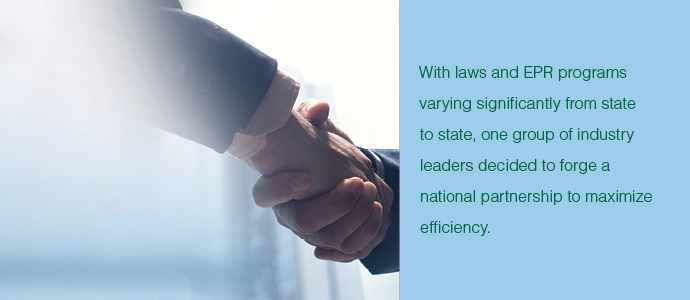
This article appeared in the December 2023 issue of Resource Recycling. Subscribe today for access to all print content.
The first day of the 2023 Resource Recycling Conference in Orlando featured on-stage discussions exploring the industry’s evolution in multiple ways.
At the core of the conversation was a straightforward message: Municipal recycling has become a critical public service, but innovation is needed to help the sector continue to keep pace with the needs of city leaders, end users of material and society in general.
As a MRF operator, “when you engage in long-term partnership with a community, it’s not a normal business relationship,” said Joaquin Mariel, chief commercial officer at Balcones Resources. “It becomes a literal co-investment in long-term infrastructure. It is a co-investment between two organizations for the people in the community you live in.”
Mariel was speaking at the Resource Recycling Conference, which drew nearly 500 municipal recycling stakeholders to the Hilton Orlando in Florida this past March.
He shared the stage with Jessica Long of Closed Loop Partners and Richard McHale from the city of Austin, Texas to discuss Closed Loop Partners’ newly formed Circular Services division, which brings together a number of different operators (including Austin-based MRF operator Balcones Resources) to help create efficiency and growth in municipal recycling in various regions.
Circular Services is just one example of the bold action being taken by a variety of materials management stakeholders, including policymakers, who see the need to evolve material collection and processing – and the opportunities therein.
Long, for example, noted Circular Services is putting a focus on smaller, modular MRFs and anaerobic digestion sites that can help process materials closer to where they are generated, reshaping the conversation around industry economics.
“This will be an area of a lot of expansion over the next few years,” Long noted.
‘Environmental return on investment’
Another session at the conference featured Florida Polytechnic University researcher Malak Anshassi, who published a study looking at the economic and environmental impacts of recycling programs.
Among other findings, Anshassi’s work found that if a local waste program in Florida dropped curbside recycling service, the program’s greenhouse gas (GHG) emissions could increase as much as 20-fold.
She also noted that, depending on material markets, recycling’s “environmental return on investment” can be higher for a household than it would be if the household swapped out an internal-combustion engine car for an electric vehicle. In other words, per dollar spent, recycling’s emissions impact is greater.
She said it’s worthwhile for communities to look at the impacts – both economic and environmental – associated with each material it collects.
“Each material has a role in mitigating climate change and some have a higher role,” Anshassi said. “It’s OK to prioritize those materials.”
The conference agenda also featured standing-room-only crowds at a pair of workshops – one focused on resident behavior change, delivered by The Recycling Partnership, and a second exploring how to use digital data to help direct local program decision-making.
Equity, policy and more
The conference continued with a panel called “Navigating Complexities in Racial and Social Equity,” featuring voices from The Recycling Partnership, the city of Orlando and the city of Baltimore.
That opening discussion explored how local programs can move forward on material collection and processing objectives while also addressing historical inequities within the waste sector workforce as well as in how public services are offered to different segments of a local population.
The agenda for the conference’s second day featured a look at how container deposit legislation fits into the wider policy push that is currently reshaping the recycling sector. And the closing session helped attendees understand the intersection between extended producer responsibility for plastic and society’s current focus on plastic use and pollution.
The legislative arena also received lots of analysis during the conference’s Policy Talks side stage discussions, presented by the Eunomia consultancy.
Those conversations will unpack many of the nuances of the recycling policy landscape, featuring experts from the New Jersey Department of Environmental Protection, Circular Action Alliance, Amcor, the U.S. Plastics Pact and more.
In addition, with the conference happening in Florida, the national audience of recycling leaders in attendance got a textured look at materials recovery in the Sunshine State. The agenda featured tours at a Coca-Cola Beverages Florida bottling and distribution site as well as an introduction to how sustainability and recycling are handled at Orlando’s professional soccer venue, Exploria Stadium.
Elsewhere on the program was a look at how various Florida counties use coordination between jurisdictions to make recycling more economically viable. That session was part of the partnership between the 2023 Resource Recycling Conference and Recycling Florida Today, the state recycling organization in Florida.
And officials from Coral Springs, Fla. discussed how that municipality recently brought recycling back after suspending service due to economic struggles.
That conversation about the importance of recycling at the local level dovetailed well with what speakers discussed at the conference.
“Even though recycling comes at a cost, it’s at a worthwhile cost,” Anshassi said.
Dan Leif is the former editorial director of Resource Recycling.
This article appeared in the December 2023 issue of Resource Recycling. Subscribe today for access to all print content.

